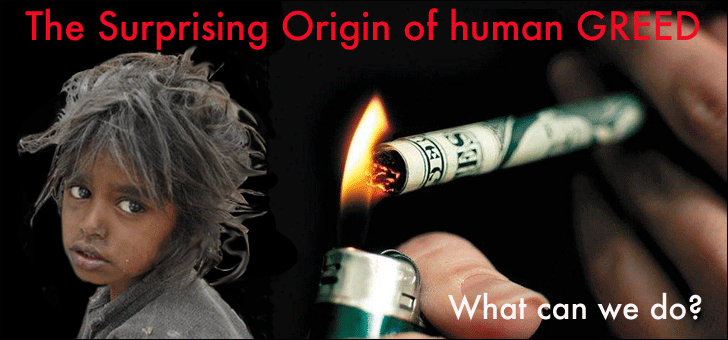
The Great Motivator: Greed
By Gary Vey for viewzone (http://www.viewzone.com/greed.html)
I've lived through the best of times and the worst of times. A little over a decade ago, America was prosperous. Unemployment was at record lows. McDonald's was happily paying nearly $10 an hour to burger chefs. The government actually worried about how to spend its surplus tax revenue. There was talk of using the surplus to permanently secure Social Security for the aged or providing every American citizen with medical insurance.
Unfortunately that dream didn't last long, ending not coincidentally with the Supreme Court ruling that put George W. Bush in the Whitehouse on a technicality, despite losing the popular vote to Al Gore in 2000.
A decade of useless wars followed, designed to siphon trillions of tax dollars to military contractors like Halliburton and numerous mercenary armies like Blackwater.
 Not wanting to be left out of the feeding frenzy, bankers and financial institutions designed elaborate schemes to rip poor people from their homes, decimating the finances and futures of millions of American families. Adding to the insult, these same bankers used our tax money to pay lavish bonuses to their executives who designed and implememted this financial rape. Then it was the energy corporations turn at the game. While gas prices soared to $5 a gallon for no logical reason, oil companies like Exxon announced 500% increases in annual profits. Today, America is technically bankrupt.
Not wanting to be left out of the feeding frenzy, bankers and financial institutions designed elaborate schemes to rip poor people from their homes, decimating the finances and futures of millions of American families. Adding to the insult, these same bankers used our tax money to pay lavish bonuses to their executives who designed and implememted this financial rape. Then it was the energy corporations turn at the game. While gas prices soared to $5 a gallon for no logical reason, oil companies like Exxon announced 500% increases in annual profits. Today, America is technically bankrupt.
We're now faced with many years of austerity with double digit unemployment, homelessness and hopelessness. The gap between the extremely wealthy and the average struggling American has never been wider.
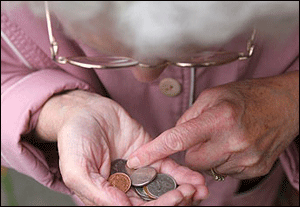 How bad will it get? Entitlement programs such as Social Security and Medicare -- designed to protect those who are most vulnerable -- are now on the budget chopping block because wealthy politicians and rich corporations arrogantly refuse to pay their fair share of taxes.
How bad will it get? Entitlement programs such as Social Security and Medicare -- designed to protect those who are most vulnerable -- are now on the budget chopping block because wealthy politicians and rich corporations arrogantly refuse to pay their fair share of taxes.
No, this isn't going to be a political story. I'm not going to be blaming anyone for the ills that are consuming the world. I want to make the point, however, that all of these ills -- and many more -- are the result of GREED.
Wars, genocide, starvation and corruption are all symptoms of human greed. But what causes this source of evil and suffering? Do we know?
The Psychology of Greed
Most people think that greed is just an extension of the survival instinct. Like animals, people are concerned about having enough resources to survive times when those resources are scarce. Squirrels hoard nuts for the winter and humans hoard wealth as a guard against an uncertain future. But this view is wrong.
Animals in the wild cooperate in hunting prey. The kill is then eaten by members of the pack in order of group hierarchy. While the pack leaders get the choice pieces, all of the group eventually get their fill. Only when the natural order is disrupted (i.e. being fed by humans in captivity), do we see competitive behavior that we interpret as greed. In reality it is the animal's fear that it will not get enough.
Human greed is inherently different. It is characterized by non-cooperation for the common good and the realization that the greedy behavior hurts others. Indeed, greed is uniquely human.
In the 1980s several experiments [1,2,3] were specifically designed to evaluate why people do not cooperate for the collective good. Is it because of selfish greed or, like animals, because they fear they will not get enough through the cooperation?
I've lived through the best of times and the worst of times. A little over a decade ago, America was prosperous. Unemployment was at record lows. McDonald's was happily paying nearly $10 an hour to burger chefs. The government actually worried about how to spend its surplus tax revenue. There was talk of using the surplus to permanently secure Social Security for the aged or providing every American citizen with medical insurance.
Unfortunately that dream didn't last long, ending not coincidentally with the Supreme Court ruling that put George W. Bush in the Whitehouse on a technicality, despite losing the popular vote to Al Gore in 2000.
A decade of useless wars followed, designed to siphon trillions of tax dollars to military contractors like Halliburton and numerous mercenary armies like Blackwater.
 Not wanting to be left out of the feeding frenzy, bankers and financial institutions designed elaborate schemes to rip poor people from their homes, decimating the finances and futures of millions of American families. Adding to the insult, these same bankers used our tax money to pay lavish bonuses to their executives who designed and implememted this financial rape. Then it was the energy corporations turn at the game. While gas prices soared to $5 a gallon for no logical reason, oil companies like Exxon announced 500% increases in annual profits. Today, America is technically bankrupt.
Not wanting to be left out of the feeding frenzy, bankers and financial institutions designed elaborate schemes to rip poor people from their homes, decimating the finances and futures of millions of American families. Adding to the insult, these same bankers used our tax money to pay lavish bonuses to their executives who designed and implememted this financial rape. Then it was the energy corporations turn at the game. While gas prices soared to $5 a gallon for no logical reason, oil companies like Exxon announced 500% increases in annual profits. Today, America is technically bankrupt.We're now faced with many years of austerity with double digit unemployment, homelessness and hopelessness. The gap between the extremely wealthy and the average struggling American has never been wider.
 How bad will it get? Entitlement programs such as Social Security and Medicare -- designed to protect those who are most vulnerable -- are now on the budget chopping block because wealthy politicians and rich corporations arrogantly refuse to pay their fair share of taxes.
How bad will it get? Entitlement programs such as Social Security and Medicare -- designed to protect those who are most vulnerable -- are now on the budget chopping block because wealthy politicians and rich corporations arrogantly refuse to pay their fair share of taxes.No, this isn't going to be a political story. I'm not going to be blaming anyone for the ills that are consuming the world. I want to make the point, however, that all of these ills -- and many more -- are the result of GREED.
Wars, genocide, starvation and corruption are all symptoms of human greed. But what causes this source of evil and suffering? Do we know?
The Psychology of Greed
Most people think that greed is just an extension of the survival instinct. Like animals, people are concerned about having enough resources to survive times when those resources are scarce. Squirrels hoard nuts for the winter and humans hoard wealth as a guard against an uncertain future. But this view is wrong.
Animals in the wild cooperate in hunting prey. The kill is then eaten by members of the pack in order of group hierarchy. While the pack leaders get the choice pieces, all of the group eventually get their fill. Only when the natural order is disrupted (i.e. being fed by humans in captivity), do we see competitive behavior that we interpret as greed. In reality it is the animal's fear that it will not get enough.
Human greed is inherently different. It is characterized by non-cooperation for the common good and the realization that the greedy behavior hurts others. Indeed, greed is uniquely human.
In the 1980s several experiments [1,2,3] were specifically designed to evaluate why people do not cooperate for the collective good. Is it because of selfish greed or, like animals, because they fear they will not get enough through the cooperation?
Subjects were given an identical number of coins and separated in groups of six. They were told that they could contribute or remove coins from a common pool. After every trial the number of coins in the pool would be multiplied by 1.25 and at the end of the experiment the number of coins in the pool would be divided equally among the subjects. Naturally, it should benefit each subject to make the pool as large as possible since the experimenters would multiply and contribute to its size.
False feedback was provided indicating that in some phases the size of the pool was increasing, decreasing or remaining constant. This was a clue to each subject about what other contributors to the pool were doing. If the size of the pool decreased, it could be implied that other participants were selfishly taking coins while an increase in the pool would imply that other participants were trying to increase the final shared portion.
Subjects contributed significantly less to the common pool when it increased than when it decreased. This showed that greed and not fear of not getting enough or being gypped was the major motivation behind not contributing to the common pool. [1]Humans have the intellect and empathy to realize when their behavior hurts others. This superior insight separates humans from animals and should foster a sense of social responsibility. Psychologists have tried to understand what motivates a person to ignore the social consequences of accumulating resources that go beyond reasonable future needs. Their studies have revealed some surprising facts about greed.
Greed and Self-Esteem
A breakthrough in understanding human motivation came by way of the Terror Management Theory (TMT) which proposes that humans, by virtue of our superior intellect, are uniquely capable of understanding our mortality. This fact directly opposes our survival instinct and sense of self-preservation to the extent that it causes subconscious terror. Terror is defined as an unresolvable conflict that causes anxiety.
Psychologists have evolved the Terror Management Theory [5] to include what they call the Anxiety Buffer [6]. This buffer mediates the terror of mortality by cultivating self-esteem. The devastation of being a temporary being, with all of its ramifications of worth and purpose, is mediated by our sense of being a meaningful part of the world we live in -- our world view.
This theory has been well tested [7,8,9,10,11,12] by subjecting people to subtle reminders of their mortality, then measuring such things as their propensity for greed and their increased need to feel part of some larger culture that perpetuates a world view in which our mortality is insignificant. Our self-esteem is measured by the degree to which we conform to this cultural world view .
"Experimental research has revealed that this desire for self-esteem has wide-ranging effects on cognition, emotion, and behavior. Terror management theory explains that this desire for self-esteem results from a fundamental need for psychological security, which is engendered by humans' awareness of their own vulnerability and mortality. A large body of evidence has supported this explanation. Specifically, substantial lines of research have shown that self-esteem buffers anxiety and reduces defenses against death and that reminders of mortality increase efforts to defend and bolster self-esteem. [17]It has been argued that our present culture places a high value on greed, materialism and wealth (Greenburg 1990). It is only natural then that, when we are reminded of our mortality, we should unconsciously strive to achieve the goals of this culture. So potent is the terror of our mortality that we are blinded to the detrimental effects of our greed on others. All of this happens as a function of our Anxiety Buffer which minimizes death anxiety before it reaches consciousness.
Near Death Experiences: Death Reflections
Psychologists refer to subtle reminders of death as Mortality Salience. These can be questions about a dead family member, inquiries about our own funeral plans, photographs of dead people shown for only 1/24th of a second -- in one experiment, Mortality Salience was measured merely by interviewing subjects near a funeral home. In most experiments the subjects do not consciously know that they have been reminded of their own mortality and report feeling no change in emotions. But the effects of Mortality Salience on their behavior are sometimes quite dramatic.
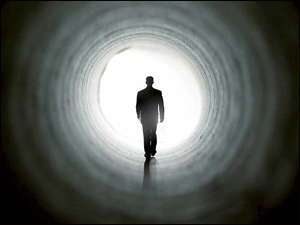 In studies dealing directly with human greed [12,13,14,15], Mortality Salience has been found repeatedly to elicit selfish, non-cooperative behavior when dealing with finite resources. But psychologists were puzzled by the reactions of Mortality Salience on a particular group of people who have at some time had a near death experience (NDE). These people did not show the typical responses [18]. Rather, they were characterized by unselfishness, cooperation towards the common good and were markedly non-material.
In studies dealing directly with human greed [12,13,14,15], Mortality Salience has been found repeatedly to elicit selfish, non-cooperative behavior when dealing with finite resources. But psychologists were puzzled by the reactions of Mortality Salience on a particular group of people who have at some time had a near death experience (NDE). These people did not show the typical responses [18]. Rather, they were characterized by unselfishness, cooperation towards the common good and were markedly non-material.It is theorized that Mortality Salience elicits fear of the "unknown" in most people. But in people who have experienced death already, this is a known phenomenon -- what has been termed a Death Reflection. With the Death Reflection, the Anxiety Buffer is not needed, implying that the terror of death has been overcome.
| Top 7 Reasons People Fear Death
1: Decomposition of the body, being consumed by insects or worms.2: Loss of consciousness and awareness of self.
3: Fear of how death will effect loved ones. 4: Fear of being forgotten forever. 5: Fear of an unknown reality awaiting us in the afterlife. 6: Fear of the consequences of our acts when we were alive. 7: Fear of not having achieved our life's goals. [4] |
Anxiety Buffers and PTSD
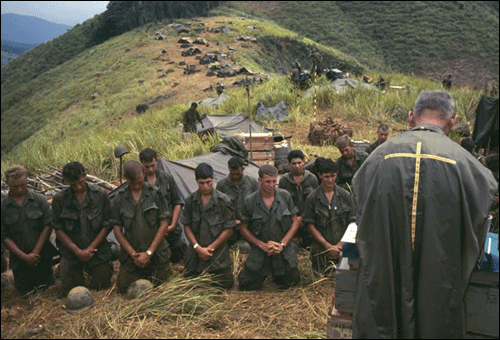
"The war in Vietnam is not like these other wars. Yet, finally, war is always the same. It is young men dying in the fullness of their time. It is trying to kill a man that you do not even know well enough to hate. Therefore, to know war is to know that there is still madness in this world."-- President Lyndon JohnsonWhile we are faced with reminders of our mortality on a daily basis, properly functioning buffers are quite efficient at reducing or eliminating death anxiety before it reaches consciousness. But for a particular set in the population, this anxiety is more or less constant. Psychologists have postulated that this condition, known as Post Traumatic Stress Disorder (PTSD) is brought about by a disruption of the Anxiety Buffer, due to some horrific trauma, which has damaged one or both of the essential elements the buffer uses to divert attention on our mortality: self-esteem and faith in our world view.
We are perhaps most familiar with PTSD in war veterans who live with depression and anxiety -- often characterized by over-reactions to everyday stress. What we are just beginning to understand is that this condition arises from an extreme life event that has destroyed one of the most basic aspects of human self-esteem: that humans are superior to animals.
We generally regard the lives of animals as having less value. We use them for food and labor and take pride in our superior intellect and morality; however, in times of war we see many atrocities which can shatter this basic tenet. Human life is devalued. We see that we are no better - often worse- than animals and our self-esteem can be forever shattered.
Our faith in cultural institutions that form our world view can also be shaken by the dissonance of inhumane policies and practices. Patriotism can often conflict with religious beliefs; propaganda can conflict with reality.
With the disruption of one's Anxiety Buffer, death anxiety is unchecked. Sometimes the pain and depression results, somewhat ironically, in suicide or drug abuse as a means of ending the pain.
"The disruption of the Anxiety Buffer is posited to occur when traumatic life events undermine one's ability to maintain fundamental aspects of one's cultural world view that provide a sense of safety and security in an otherwise frightening world. [16]Resolving the Terror of Mortality
Religious beliefs usually provide an explanation of human mortality that includes a means to continue existence following death. Belief in a heaven or hell is the most common argument against mortality but other faiths describe a "soul" or spirit that will become part of a reality that we are assured will be adequate (although perhaps not understood in our lifetime).
 Several studies have shown that religion is only effective in mediating death anxiety in intrinsic individuals (i.e. people who are introspective and internally motivated) and that it has only minimal effects in extrinsics (i.e. people who are externally motivated). [19]
Several studies have shown that religion is only effective in mediating death anxiety in intrinsic individuals (i.e. people who are introspective and internally motivated) and that it has only minimal effects in extrinsics (i.e. people who are externally motivated). [19]Some religions do not address the afterlife and therefore foster world views where greed is the only functional means of coping with death anxiety. These religions contribute to the sequelae of war, racism, conflict, and materialism despite attempts to foster cultural morality.
Nationalism and patriotism strive to be effective buffers through the elevation of self-esteem. Pride in one's country or political group, belief that one is part of a "chosen" people or engaging in a social movement all serve to promote the idea that an individual can attain symbolic immortality and rise above the transient, insignificance of human mortality.
Psychologists have noted that people generally prefer to invest their self-esteem in an established group rather than individually. In fact, according to the Terror Management Theory, groups arise from the need to establish self-esteem. Republicans, Democrats, Socialists, Communists, Liberals, Conservatives -- all these serve to accommodate a particular world view that reduces the death anxiety while supporting greedy behavior. In other words, it becomes socially acceptable to behave selfishly and hurt others as long as the "others" are outside one's special group.
"In the presence of a vulnerable opponent, group members tend to provide social support for immediate self-interests." [14]Could this explain the selfish acts that we see in the world?
| Institutional Greed: Game Over!
An event that would change our lives passed with little or no fanfare on January 21, 2010. It happened silently. Hardly anyone knew until it was too late. Now it is too late.
On that date the Supreme Court of these United States decided that corporations, be they American or foreign, are afforded the same rights as a single individual when it comes to contributing money to a political cause (like a piece of legislation) or candidate running for a political office (like a Senator or president). Let me say it again. Under the January 21, 2010 ruling, a corporation -- be they American or foreign -- can use UNLIMITED funds to support a specific government policy or candidate running for political office. Stop and think about that. 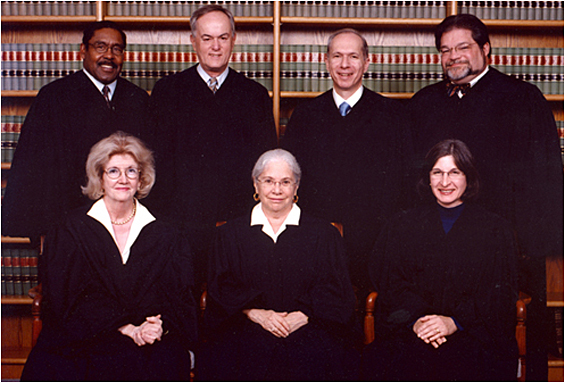 Democracy before and after January 21, 2010 The word comes from the greek demokratia, which means "rule of the people." I won't insult you by defining what it is. In school we learned about the Greeks who voted by raising their hands and being counted, or by writing on clay shards that were secretly collected in a large vase. This kind of democracy can still be seen in small town meetings where citizens vote on such things as zoning, new roads and raising taxes for the local school. It's what sets America apart from other countries -- rule of the people, by the people, for the people. 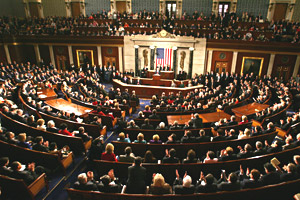 One vote, one person For about 100 years now, the strength and power of an individual's single vote has been protected by laws that regulated the amount of money that a large group, like a labor group or corporation, could use to influence votes. Why? Sometimes the needs and goals of particular groups often do not mesh with the needs and goals of a majority of citizens. For example: Nuclear power companies might seek a profitable action that requires changes to government safety policies, endangering the people living around them. To do this they might have to enter their own chosen candidates for the Senate, or make sure that loyal Senators are re-elected. Corporations are not human Corporations have a charter that their business plan must yield a profit for shareholders. This is institutionalized greed in its purest form. A corporation is a process, started and maintained by people, yet able to outlive them and go against the people it serves. Of course, individual citizens who are members of a labor group or a corporation have their single vote, so they still have influence, but the influence of groups can surpass their collective influence through their ability to generate huge amounts of cash. So for about 100 years the government has limited the amount of money that a corporation or group can donate to a candidate running for political office to represent the people. This made perfect sense, since the candidates are supposed to be representing "the people" and not the interest of a group. Right? How it works now On January 21, 2010 the Supreme Court decided that corporations have the same right to influence political elections as you and I. It's wide open for them now. OK, let me get specific. 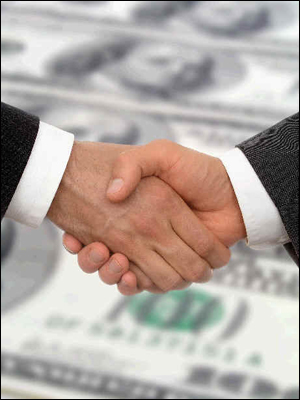 Imagine that a drug company has new medicine for high blood pressure. They have tested it and think it works pretty good, but there have been some side effects and some people have died. Let's say that under the present laws regulating drug companies there is the possibility that people who take this medicine and get ill or die can result in costly law suits against the company for millions of dollars. The drug company knows that this will be a reality but they have already invested hundreds of millions of dollars in developing this medicine and owe it to their shareholders to recoup a profit. Imagine that a drug company has new medicine for high blood pressure. They have tested it and think it works pretty good, but there have been some side effects and some people have died. Let's say that under the present laws regulating drug companies there is the possibility that people who take this medicine and get ill or die can result in costly law suits against the company for millions of dollars. The drug company knows that this will be a reality but they have already invested hundreds of millions of dollars in developing this medicine and owe it to their shareholders to recoup a profit.Imagine that certain senators have proposed a bill that would limit or dissolve the ability of an average citizen to sue a large drug company for negligence. Imagine that they are up for re-election. Imagine that other senators, or candidates seeking a senate seat, who will eventually vote on this bill are in need of campaign funds. The new ruling does not prohibit the drug company from spending millions -- even billions -- to influence these decisions which are clearly in the interest of the corporation and contrary to what is morally right for the American citizen. The media will be inundated with propaganda about these supportive candidates, competing with their millions of dollars against grass roots candidates with funds limited to the contributions of their fellow citizens. Money talks and millions of dollars shouts very loud. Halliburton and the Carlyle Group will now be able to buy candidates to promote more wars and weapons production. Food producers will support candidates who lower standards and jeopardize our health for increased profits. We might even see a resurgence of cigarettes -- this would benefit both the tobacco corporations AND the health industry. What can we do? Nothing. Absolutely nothing. It has been said that "the supreme court is not final because it is supreme -- it is supreme because it is final." It is the end of the road as far as legislation goes. Even an Executive Order by the president cannot reverse this. It is like the doctor telling the patient he is terminal and inoperable. Democracy has ended for America. Greed has triumphed. But it's not just America that has been dealt a lethal dose of capitalism -- others will go down with us. Corporations are often multi-national. They will begin altering the trade laws like some virus that exists only to perpetuate more profits and greed. Soon there might be no more America, or England, or China. There will be Halliburton-Carlyle Enterprises, The Global Pharmaceutical Corporation, Universal Oil, Nuclear Energy & Coal... Corporations will run everything for their own profit and the citizens of the world will be significant only as consumers -- the necessary "eaters" to provide labor and to buy the products we are told that we need. God help us all. |
Notes:
[1] Matthijs Poppel and Lisbeth Utens, Tilburg University, The Netherlands, Journal of Economic Psychology,Volume 7, Issue 1, March 1986, Pages 61-73.
[2] Amnon Rapoport and Dalit Eshed-Levy, University of North Carolina at Chapel Hill, USA, Organizational Behavior and Human Decision Processes, Volume 44, Issue 3, December 1989, Pages 325-344.
[3] Ramzi Suleiman, Provision of Step-Lelev Public Goods Under Uncertainty: A Theoretical Analysis,Rationality and Society May 1997, Vol. 9, No. 2, 163-187.
[4] Helplessness: A Hidden Liability Associated with Failed, Defenses against Awareness of Death, Mario Mikulincer, Interdisciplinary Center (IDC) Herzliya, Phillip R. Shaver, University of California, Davis
[5] Greenberg, Pyszczynski, Solomon, Rosenblatt, Veeder, Kirkland and Lyon 1990; Greenberg, Simon, Pyszczynski, Solomon and Chatel 1992; Rosenblatt, Greenberg, Solomon, Pyszczynski and Lyon 1989
[6] T. Pyszczynski & Pelin Kesebir, Anxiety, Stress & Coping, Vol. 24, Issue 1 (2011)
[7] Greenberg, J., Simon, L., Harmon-Jones, E., Solomon, S., Pyszczynski, T. and Lyon, D. (1995), "Testing alternative explanations for mortality salience effects: Terror management, value accessibility, or worrisome thoughts?" European Journal of Social Psychology, 25: 417-433.
[8] "Age-related differences in responses to thoughts of one's own death: Mortality salience and judgments of moral transgressions", Maxfield, Molly; Pyszczynski, Tom; Kluck, Benjamin; Cox, Cathy R.; Greenberg, Jeff; Solomon, Sheldon; Weise, David, Psychology and Aging, Vol 22(2), Jun 2007, 341-353.
[9] The impact of mortality salience on reckless driving: A test of terror management mechanisms. Ben-Ari, Orit Taubman; Florian, Victor; Mikulincer, Mario Journal of Personality and Social Psychology, Vol 76(1), Jan 1999, 35-45.
[10] "The siren's call: Terror management and the threat of men's sexual attraction to women", Landau, Mark J.; Goldenberg, Jamie L.; Greenberg, Jeff; Gillath, Omri; Solomon, Sheldon; Cox, Cathy; Martens, Andy; Pyszczynski, Tom, Journal of Personality and Social Psychology, Vol 90(1), Jan 2006, 129-146.
[11] Sympathy for the Devil: Evidence that Reminding Whites of their Mortality Promotes More Favorable Reactions to White Racists, Jeff Greenberg, Jeff Schimel, AndyMartens, Sheldon Solomon and Tom Pyszcnyski, Motivation and Eotion, Vol. 25, No. 2, 2001
[12] Russell J. Webstera; Donald A. Sauciera, "The Effects of Death Reminders on Sex Differences in Prejudice Toward Gay Men and Lesbians", Journal of Homosexuality, Volume 58, Issue 3, 2011, Pages 402-426
[13] Philip J. Cozzolino, University of Minnesota, Angela Dawn Staples, Lawrence S. Meyers, Jamie Samboceti, Greed, Death, and Values: From Terror Management to Transcendence Management Theory, (http://psp.sagepub.com/content/30/3/278.short)
[14] John Schopler, Chester A. Insko, Kenneth A. Graetz, Stephen Drigotas, Valerie A. Smith, Kenny Dahl, University of North Carolina at Chapel Hill , "Individual-Group Discontinuity: Further Evidence for Mediation by Fear and Greed"
[15] Greenberg, Jerald, Effects of reward value and retaliative power on allocation decisions: Justice, generosity, or greed?, Journal of Personality and Social Psychology, Vol 36(4), Apr 1978, 367-379
[16] Pelin Kesebir, University of Colorado at Colorado Springs; Aleksandra Luszczynska, Warsaw School of Social Sciences and Humanities; Tom Pyszczynski, University of Colorado at Colorado Springs; Charles Benight, University of Colorado at Colorado Springs; Posttraumatic Stress Disorder Involves Disrupted Anxiety-Buffer Mechanisms, Journal of Social and Clinical Psychology, Forthcoming
[17] Greenberg, Jeff, Understanding the vital human quest for self-esteem, Perspectives on Psychological Science, Vol 3(1), Jan 2008, 48-55.
[18] Philip J. Cozzolino, University of Minnesota; Angela Dawn Staples, Lawrence S. Meyers, Jamie Samboceti, California State University, Sacramento; Greed, Death, and Values: From Terror Management to Transcendence Management Theory (http://psp.sagepub.com/content/30/3/278.short)
[19] Jonas, Eva; Fischer, Peter,Terror management and religion: Evidence that intrinsic religiousness mitigates worldview defense following mortality salience, Journal of Personality and Social Psychology, Vol 91(3), Sep 2006, 553-567.
interesting view point
ReplyDelete